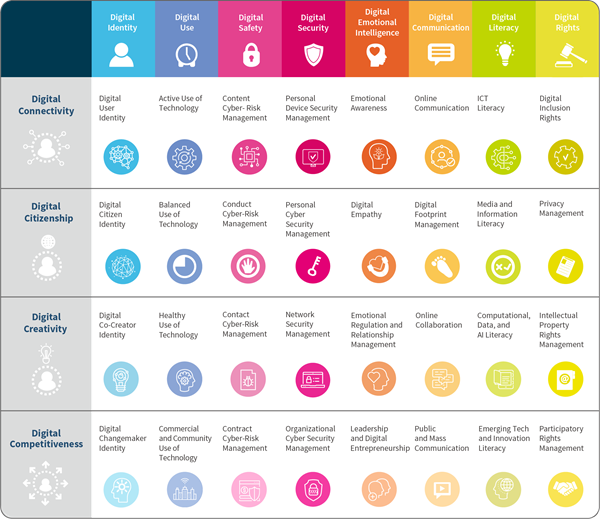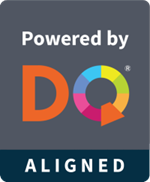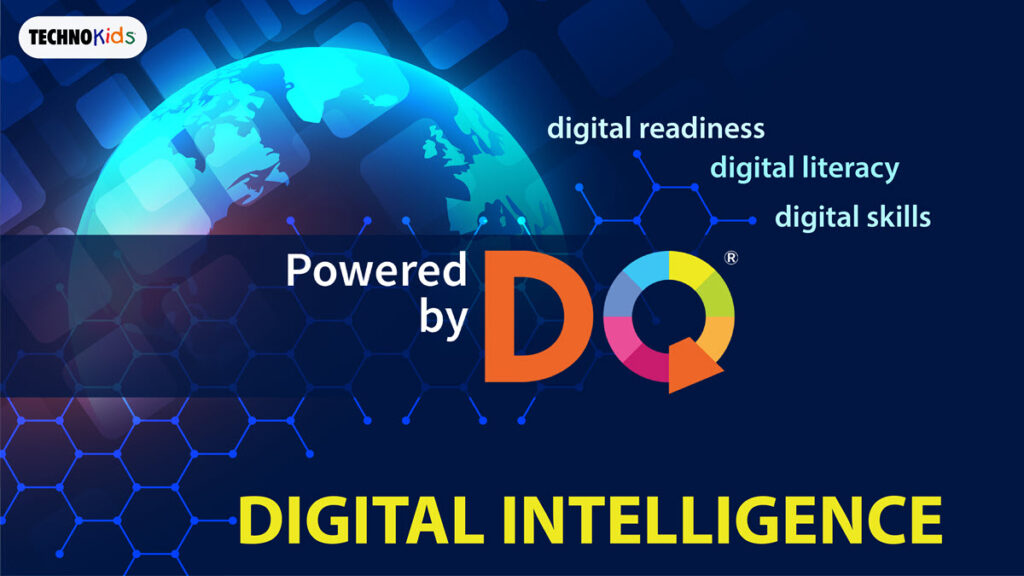TechnoKids is Powered by DQ, which means that teachers can be confident our curriculum aligns to global standards for digital intelligence. DQ Lab recently granted ALL TechnoKids curriculum collections their seal of approval. This certifies the program delivers high-quality learning experiences.
DQ stands for Digital Intelligence. The DQ framework outlines the skills, knowledge, and attitudes people need to face the challenges of digital life. The structure organizes digital literacy, digital skills, and digital readiness into 32 competencies.

Digital Intelligence Competencies
Teachers can use the DQ taxonomy to understand what children need to become future-ready citizens. The DQ competencies are divided into eight areas, including digital identity, use, safety, security, emotional intelligence, communication, literacy, and rights. These areas are then further divided into four levels of mastery. The first level is digital connectivity which is a prerequisite to the other three levels, which are digital citizenship, digital creativity, and digital competitiveness. Students transition from the ability to simply connect with technology, to the capacity to be safe, create original content, and solve global challenges. The goal is to have students become the innovators of tomorrow.

TechnoKids is Powered by DQ

TechnoKids Curriculum Collections align with multiple digital intelligence
competencies within the DQ Global Standards (IEEE 3527.1TM).
When you use the TechnoKids Complete Collection to teach your students, feel secure knowing they are gaining the competencies they need to thrive in an ever changing digital landscape. As students progress through the program, they gradually develop essential knowledge, skills, and attitudes. Empower your students to stay safe, be secure, foster meaningful relationships, communicate effectively, create new ideas, and behave ethically.
If you are looking for computing curriculum that emphasizes digital intelligence, then the TechnoKids program might be for you. Learn more about our popular Collections.
Primary Collection | Ages 6-8
- The Primary TechnoKids Curriculum for ages 6-8, aligns to the digital connectivity and creativity competencies. With this collection, you can be assured that students will build a foundation for future success. Specifically, the TechnoKids Primary projects align to Computational, Data, and AI Literacy, Active Use of Technology, Personal Device Security, and ICT Literacy.
Junior Collection | Ages 8-11
- The Junior TechnoKids Curriculum for ages 8-11, aligns to all four levels of competencies including connectivity, citizenship, creativity, and competitiveness. With this collection, you can be confident students will develop the essential knowledge and skills for a healthy digital life. Specifically, the TechnoKids Junior projects align to Digital Citizen Identity, Digital Empathy, Media and Information Literacy, Privacy Management, Online Collaboration, Computational, Data, and AI Literacy, Intellectual Property Rights Management, Public and Mass Communication, Digital User Identity, Active Use of Technology, Content Cyber-Risk Management, Online Communication, and ICT Literacy.
Intermediate Collection | Ages 11-14
- The Intermediate TechnoKids Curriculum for ages 11-13, also aligns to all four levels of competency including connectivity, citizenship, creativity, and competitiveness. With this collection, you can be positive that students will competently transform creative ideas into reality using technology. Specifically, the TechnoKids Intermediate projects align to Digital Citizen Identity, Media and Information Literacy, Digital Co-Creator, Online Collaboration, Computational, Data, and AI Literacy, Intellectual Property Rights Management, Digital Changemaker Identify, Commercial and Community Use of Technology, Public and Mass Communication, Emerging Technology and Innovation Literacy, Digital User Identity, Active Use of Technology, Online Communication, and ICT Literacy.
Senior Collection | Ages 13-18
- The Senior TechnoKids Curriculum for ages 13-18, aligns to all four levels of competency including connectivity, citizenship, creativity, and competitiveness. With this collection, you can be guaranteed that students will master digital competencies for solving global challenges and driving innovation. Specifically, the TechnoKids Senior projects align to Balanced Use of Technology, Media and Information Literacy, Online Collaboration, Computational, Data, and AI Literacy, Intellectual Property Rights Management, Public and Mass Communication, Online Communication, and ICT Literacy.
The DQ framework provides the structure for designing high-quality curriculum. TechnoKids publishes new projects each year. With a focus on DQ global standards, our team will continue to develop learning opportunities that prepare students for the future.
DQ Global Standards Microcredentials (GSM) and TechnoKids Curriculum
DQ divides each competency into microcredentials. The TechnoKids Complete Collection, which consists of the Primary, Junior, Intermediate, and Senior collections aligns to over 50 microcredentials. These are ranked below according to the number of learning messages – or how often TechnoKids assignments cover a specific learning objective.
TechnoKids curriculum primarily targets content creation, software design, and information management. However, aside from technology skills, you will notice the TechnoKids program places a strong focus on “soft skills” such as teamwork and communication. As well, our instructional materials shape personal characteristics such as kindness, empathy, integrity, and confidence.
- Basic Hardware and Software Operations
- Content Creation Skills
- Designing Algorithm Fitting to Problems
- Organizing and Processing Information
- Searching Information
- Software Design and Development
- Data Analysis and Visualization
- Teamwork
- Internet Operations
- Data Presentation and Interpretation
- Collaboration Tools
- Evaluating Information
- ICT Knowledge
- Technology Trends and Adoption
- Communication Power
- Protecting Intellectual Property
- Digital Prescence
- Influence of Digital Information
- Articulating a Compelling Story
- Understanding Public and Mass Communication
- Communication Skills
- Creating and Managing Digital Initiatives
- Digital ESG (Environmental, Social and Governance)
- Sharing the Story through Digital Platforms
- Communication Awareness
- Demystifying AI Tools
- Knowledge of Copyright
- Global Digital Citizenship
- Managing Passwords
- Understanding Digital Entrepreneurship
- Digital Transaction Literacy
- Digital Confidence
- Impacts of Computing on Life in Regards to Diversity, Accessibility and Inequality
- Privacy Protection
- Digital Fundraising
- Dealing with Content Cyber-Risks
- Online Kindness
- Managing Digital Initiatives
- Digital Integrity
- Understand Risk and Ethics of AI
- Online Empathy
- Dealing with Risky Content
- Attention and Technology
- Health Check-Digital Use
- Personal Information
- Basic Network Security Technology
- Understanding Content Cyber-Risks
- Basic Personal Security
- Skills to Deal with Behavioral Cyber-Risks
- Communicative Literacy
- SEO and Digital Marketing
- Dealing with Cyber Threats
